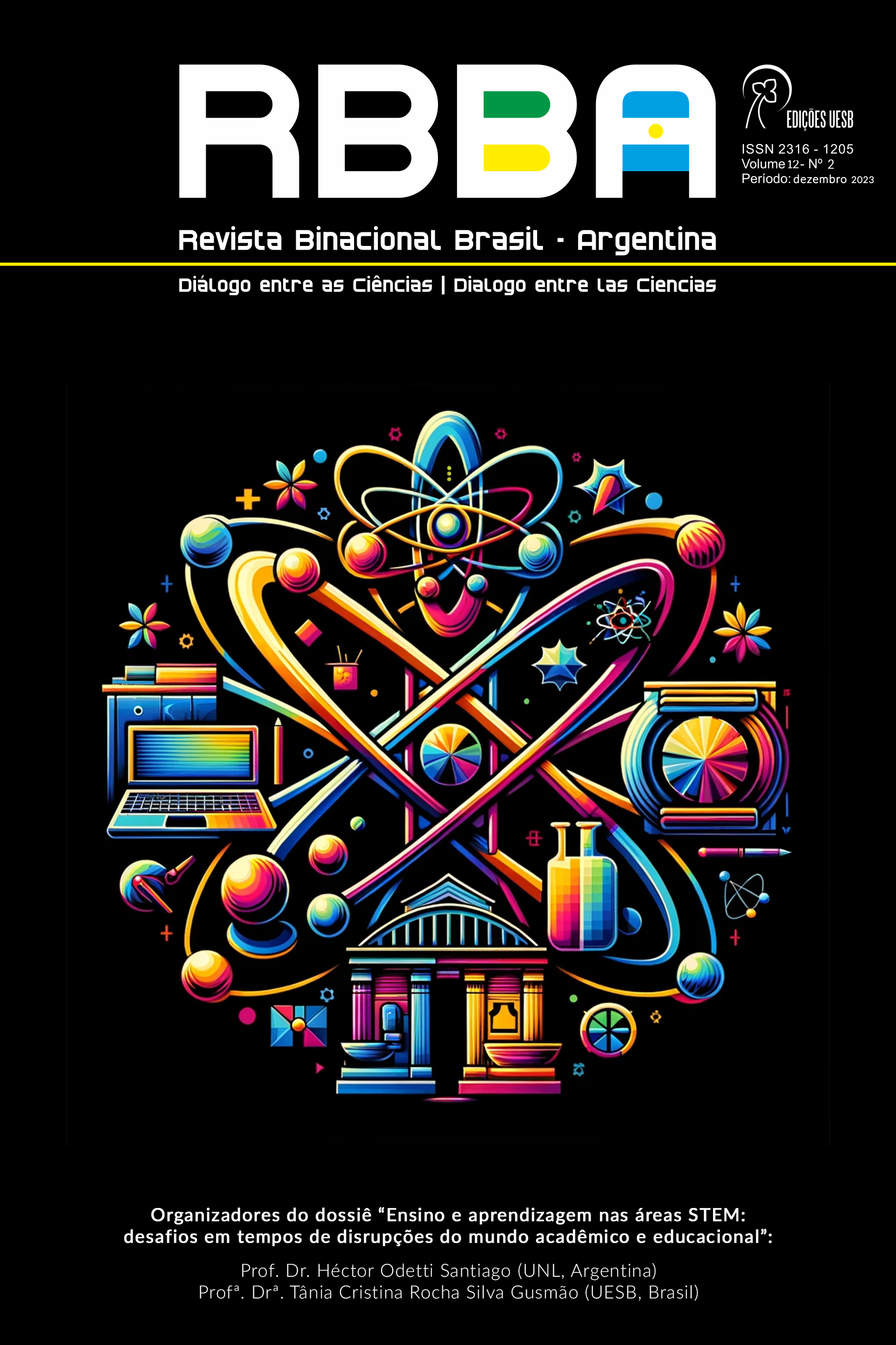TREATMENT OF AFFECTION FOR MATHEMATICS THROUGH AN ESCAPE ROOM IN 6TH GRADE OF PRIMARY EDUCATION
DOI:
https://doi.org/10.22481/rbba.v12i02.13844Keywords:
Primary Education, Problem-Based LEarning, Mathematics Education, Escape Room EducationAbstract
Many investigations show that the perception of Mathematics in formal education is mostly negative, having even created the term “mathematics anxiety” by Dreger & Aiken (1957). Facing this situation, and taking into account that the educational curriculum works on the affective dimension of the teaching-learning process, methodologies based on gamification emerge to solve it, among which the educational Escape Room stands out. Through this tool, an interdisciplinary experience of Mathematics and Physical Education is proposed with students of 6th grade of Primary Education in Santiago de Compostela. The objective of this research is to identify the impact of an educational Scape Room on the perception of students about mathematics.
Downloads
References
BLANCO, T.F.; GORGAL-ROMARÍS, A.; SALGADO, M.; SALINAS PORTUGAL, M.J.; NÚÑEZ-GARCÍA, C.; SEQUEIROS, P. G.; DIEGO-MANTECON, J.M.; ORTIZ-LASA, Z. Análisis de actividades STEAM en una educación matemática inclusiva. In: Rodríguez-Muñiz, Luis Jose; Muñiz-Rodríguez, Laura; Aguilar-González, Álvaro; Alonso, Pedro; García, Francisco Javier; Bruno, Alicia (Eds.). Investigación en Educación Matemática XXII. Gijón: Universidad de Oviedo, p. 612, 2018.
DOS REIS, J. C.; LIMA SANTANA, I.; SANTOS LEMOS, L. A Relalçao entre física e matemática: Uma abordagem teórico-metodológica. Revista Binacional Brasil-Argentina: Diálogo entre as Ciencias, v. 11, n. 2, p. 112-135, 2022.
DREGER, R. M., & AIKEN, L. R., JR. (1957). The identification of number anxiety in a college population. Journal of Educational Psychology, v. 48, n. 6, p. 344–351, 1957.
GARCÍA CASAUS, F.; CARA MUÑOZ, J. F.; MARTÍNEZ SÁNCHEZ, J. A.; CARA MUÑOZ, M. M. La gamificación en el aula como herramienta motivadora en el proceso de enseñanza-aprendizaje. Logía, educación física y deporte, v. 1, n. 2, p. 43-52, 2021.
GARRIGÓS, M. D. C.; MELLINAS-CILLER, A. C.; PELEGRÍN, C. J.; SOLABERRIETA, I.; MARTÍNEZ-ABAD, A.; FLORES, Y.; JIMÉNEZ, A. Metodologías activas y participativas para aumentar la motivación de los alumnos en los procesos de enseñanza-aprendizaje en ciencia forense en el grado de Química. In: Roig-Vila, Rosabel (coord.). Memòries del Programa de Xarxes-I3CE de qualitat, innovació i investigació en docència universitària. Convocatòria 2018-19. Alacant: Institut de Ciències de l’Educació (ICE) de la Universitat d’Alacant, 2019, p. 1683-1697.
HASIBUAN, A. M.; SARAGIH, S.; AMRY, Z. Development of Learning Materials Based on Realistic Mathematics Education to Improve Problem Solving Ability and Student Learning Independence. International electronic journal of mathematics education, v. 14, n. 1, p. 243-252, 2019.
MARBÁN, J. M.; MAROTO, A.; PALACIOS, A. Evolución de la ansiedad matemática en los maestros de primaria en formación. In: J. A. Macías, A. Jiménez, J. L. González, M. T. Sánchez, P. Hernández, C. Fernández, F. J. Ruiz, T. Fernández y A. Berciano (Eds.). Investigación en Educación Matemática XX. Málaga: SEIEM, 2016, p. 615.
MARBÁN PRIETO, J. M.; PALACIOS PICOS, A.; MAROTO SÁEZ, A. I. Desarrollo del dominio afectivo matemático en la formación inicial de maestros de primaria. AIEM-Avances de investigación en educación matemática, n.18, p. 73-86, 2020.
MARTÍNEZ HEREDIA, N.; SANTAELLA RODRÍGUEZ, E.; RODRÍGUEZ GARCÍA, A. M. Los ambientes de aprendizaje en Educación física y motivación en las primeras edades. Retos, n.38, p. 761-767, 2020.
MEZA-CASCANTE, L. G.; AGÜERO-CALVO, E.; SUÁREZ-VALDÉS-AYALA, Z.; CALDERÓN-FERREY, M.; SANCHO MARTÍNEZ, L.; PÉREZ-TYTECA, P.; MONJE PARRILLA, J. Actitud hacia la matemática: percepción de la actitud de padres. Comunicación, v. 28, n.1, p. 4-15, 2019.
MOURA, A.; SANTOS, I., L. Escape Room Educativo: reinventar ambientes de aprendizagem. In: Aplicações para dispositivos móveis e estratégias inovadoras na educação, p. 107-115, 2020.
NEGRE, C. Diez razones para utilizar un escape room educativo en clase. Educación 3.0. Recuperado de: https://www.educaciontrespuntocero.com/noticias/razones-escape- roomeducativo/78689.html 2019.
PINO, L. P. Proyecto interdisciplinar, «escuela: comunidad olímpica». Retos: nuevas tendencias en educación física, deporte y recreación, n. 25, p. 140-143, 2014.
ROMERO–BOJÓRQUEZ, L., UTRILLA–QUIROZ, A., & UTRILLA–QUIROZ, V. M. Las actitudes positivas y negativas de los estudiantes en el aprendizaje de las matemáticas, su impacto en la reprobación y la eficiencia terminal. Ra Ximhai, v. 10, n.5, p. 291-319, 2014.
SÁNCHEZ, M. L. Z.; VALLEJO, A. P.; LÓPEZ, E. J. M.; GRANADOS, S. R. La educación física escolar desde el punto de vista del alumnado de educación primaria y del estudiante de magisterio. Revista de Investigación educativa, v. 26, n. 2, p. 347-369, 2008.
SOMOZA, M. S.; BLANCO, T. F.; OLIVA, S. R. Análisis exploratorio de indicadores competenciales para infantil en una Escape Room virtual en familia. In: La tecnología como eje del cambio metodológico. Málaga: UMA Editorial, p. 1738-1741, 2020.
SUREN, N.; KANDEMIR, M. A. The effects of mathematics anxiety and motivation on students’ mathematics achievement. International Journal of Education in Mathematics, Science and Technology, v. 8, n. 3, p. 190-218, 2020.
WIEMKER, M., ELUMIR, E., Y CLARE, A. Escape room games. Game based learning, p. 55-75, 2015.
WHYTE, J.; ANTHONY, G. Maths anxiety: The fear factor in the mathematics classroom. New Zealand Journal of Teachers’ Work, v. 9, n. 1, p. 6-15, 2012.
YEPES, N. S., Y CENTENO, A. A. La Escape Room educativa como propuesta de gamificación para el aprendizaje de la Historia en Educación Infantil. Didácticas específicas, n. 22, 2020.
Downloads
Published
How to Cite
Issue
Section
License
Copyright (c) 2023 Revista Binacional Brasil-Argentina: Dialogue between the sciences

This work is licensed under a Creative Commons Attribution 4.0 International License.







